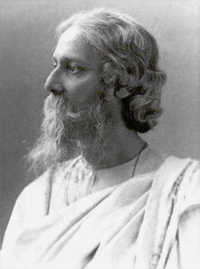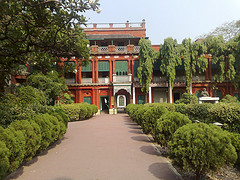This song of mine will wind its music around you, my child, like the fond arms of love.
This song of mine will touch your forehead like a kiss of blessing.
When you are alone it will sit by your side and whisper in your ear, when you are in the crowd
it will fence you about with aloofness.
My song will be like a pair of wings to your dreams, it will transport your heart to the verge of the unknown.
It will be like the faithful star overhead when dark night is over your road.
My song will sit in the pupils of your eyes, and will carry your sight into the heart of things.
And when my voice is silenced in death, my song will speak in your living heart.
– Rabindranath Tagore
 Rabindranath Tagore, a prominent cultural icon, was a famous Bengali poet, novelist, playwright, philosopher, and Nobel laureate of India. He was born on May 7, 1861 in Calcutta to Sarala Devi and Debendranath Tagore. He grew up in a very wealthy family and his house (the Tagore House) was the center of cultural and social activities at that time. Instead of formal education, Tagore was tutored at home by several teachers. At the age of seventeen, he went to England for formal education but he returned to India in 1880 without completing his studies. In 1883, Tagore married Mrinalini Devi Raichaudhuri and they had three daughters and two sons. In 1901, he established the Santineketan school (the abode of peace), which is now called Visva Bharati University.
Rabindranath Tagore, a prominent cultural icon, was a famous Bengali poet, novelist, playwright, philosopher, and Nobel laureate of India. He was born on May 7, 1861 in Calcutta to Sarala Devi and Debendranath Tagore. He grew up in a very wealthy family and his house (the Tagore House) was the center of cultural and social activities at that time. Instead of formal education, Tagore was tutored at home by several teachers. At the age of seventeen, he went to England for formal education but he returned to India in 1880 without completing his studies. In 1883, Tagore married Mrinalini Devi Raichaudhuri and they had three daughters and two sons. In 1901, he established the Santineketan school (the abode of peace), which is now called Visva Bharati University.
 Tagore began writing at a young age and published his first collection of poems, Kabi Kahani (a poet’s story) in 1878. In 1913, he won the Nobel Prize for literature for his work, Gitanjali (Song Offerings). At the George Peabody Library, we have an English translation of the Gitanjali by the author himself with an introduction by W.B. Yeats. The Friedham Library has some musical scores and recordings, which are settings of Tagore’s works by other musical composers. Although Tagore wrote mainly in Bengali, he translated several of his works into English. Our library has English translations of a few of his works. An author search in the library catalog shows that we have eighty-nine items by Tagore. To find scholarly articles about him, search some of the databases listed on the South Asian Studies guide, such as JSTOR, Project MUSE, MLA International Bibliography, Arts and Humanities Citation Index, Humanities International Index, etc.
Tagore began writing at a young age and published his first collection of poems, Kabi Kahani (a poet’s story) in 1878. In 1913, he won the Nobel Prize for literature for his work, Gitanjali (Song Offerings). At the George Peabody Library, we have an English translation of the Gitanjali by the author himself with an introduction by W.B. Yeats. The Friedham Library has some musical scores and recordings, which are settings of Tagore’s works by other musical composers. Although Tagore wrote mainly in Bengali, he translated several of his works into English. Our library has English translations of a few of his works. An author search in the library catalog shows that we have eighty-nine items by Tagore. To find scholarly articles about him, search some of the databases listed on the South Asian Studies guide, such as JSTOR, Project MUSE, MLA International Bibliography, Arts and Humanities Citation Index, Humanities International Index, etc.
Tagore played a huge role in shaping Bengali identity and culture. Known popularly as Rabindra Sangeeth (Rabindra music), his songs are sung by several famous vocal artists from the Indian subcontinent. Loved both by Indians and Bangladeshis as well as Bengalis all over the world, his songs are a treat to listen to. They are a perfect blend of both classical Indian music and folk music. Not only does he have the honor of composing the national anthem of India (Jana Gana Mana), but also of that of Bangladesh (Amar Shonar Bangla).
Need I say here that language skills or cultural knowledge are not necessary to enjoy music? While I certainly agree that they help us to better understand and appreciate the lyrics, I am sure that that you must have realized through your own experience that many times you find arts inspiring, soothing, joyous, or heart-rending even though you didn’t know the language or culture. You know it is perfect and beautiful when it touches your heart! Hence, I hope that you will take some time to listen to a few of these songs – Anondo Dhara, Ami Jene Shune, Bhenge Mor, Jokhon Porbe Na Mor, Aji Jhoro Jhoro Mukhoro, Megh Boleche Jabo Jabo, and Amar Nishito Rater. Please don’t forget to check out our collections for his literary works.

You are welcome, Rich. I am happy to hear that you feel inspired to introduce your son to Tagore’s works. Yes, this poem affected me deeply too. Tagore’s songs are truly amazing! Although I don’t understand their intricate meaning, they are very soothing and melodious to listen to.
Thanks so much. The poem you posted is deeply affecting – I have tears in my eyes as I make this comment. I believe others will be sparked by your post as well. I feel inspired to introduce my freshman son to Rabindranath Tagore.
You are welcome, Isabelle. Thanks for the comment. I am happy to know that you enjoyed the post. Yes, several of his songs have been put into music. I love them!
Thanks for posting, Chella. The songs are beautiful! I knew Tagore as a writer and poet, but had no idea he had written songs that were put into music.